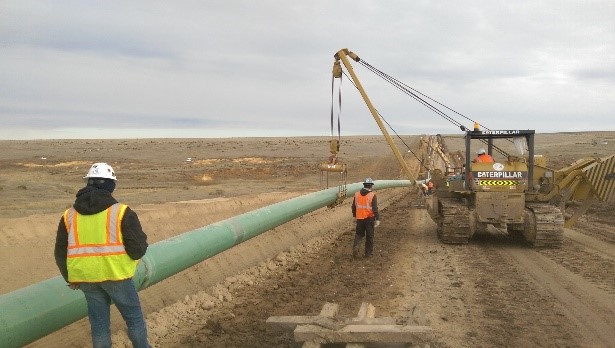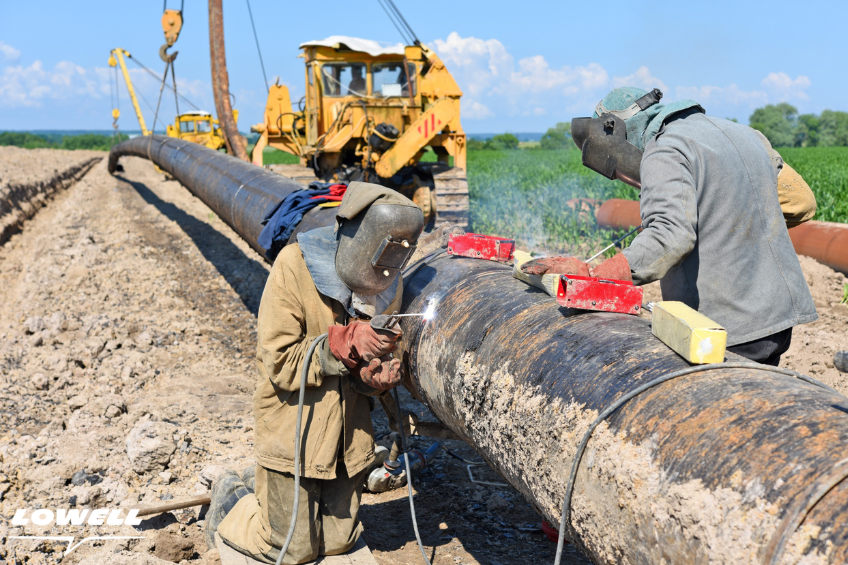A Comprehensive Overview to Recognizing Pipelines and Their Duty in Building and construction
Pipelines are essential components in construction, offering crucial features in gas, water, and waste management. Their selection and application can greatly affect a structure's performance and safety and security. Various materials, such as PVC, copper, and PEX, supply unique advantages matched to details demands (Creek Pipe Texas). Comprehending these elements is vital for any kind of building project. As one discovers the ins and outs of pipes, the effects for conformity and public wellness ended up being progressively apparent
The Relevance of Water Lines in Construction
Pipelines act as crucial conduits in building and construction, helping with the activity of water, gas, and waste throughout buildings and framework. Their function expands beyond plain transport; they are important for making certain the performance and safety and security of business and domestic settings. Correctly mounted pipes add to the effective circulation of resources, making it possible for daily activities such as cooking, heating, and bathing. Moreover, pipelines play a pivotal function in waste administration, ensuring that sewage and wastewater are successfully gotten rid of from living spaces.The significance of pipelines is additionally reflected in their influence on public health and wellness. Defective or insufficient piping systems can bring about contamination and dangerous conditions, making high quality materials and setup methods crucial. In addition, pipelines have to follow numerous building regulations and regulations, which are designed to protect both occupants and the environment. The significance of pipes in building incorporates both functional performance and vital health and wellness considerations.
Kinds Of Pipes Made Use Of in Structure Tasks
Numerous sorts of pipes play a substantial function in structure jobs, each designed to fulfill certain needs and applications. Among one of the most frequently used pipeline types are PVC, which is immune and lightweight to rust, making it optimal for drainage and air vent systems. CPVC pipes, comparable to PVC, can stand up to higher temperature levels, usually made use of in hot water systems. Copper pipes are recognized for their sturdiness and reliability, regularly used in pipes and home heating applications. Galvanized steel pipes, while much less common today, were when a requirement for water supply lines because of their toughness. Furthermore, PEX (cross-linked polyethylene) pipes are obtaining popularity for household plumbing because of their adaptability and resistance to scaling and chlorine. Cast iron pipes are preferred for their sound-dampening residential or commercial properties, frequently made use of in waste and soil systems. Each pipeline type serves unique features, guaranteeing reliable operation in building jobs.
Usual Materials for Water Lines and Their Characteristic
In building, the option of pipeline materials is important for ensuring sturdiness and performance. Steel pipelines offer stamina and resistance to high stress, while plastic pipelines give corrosion-resistant and lightweight options. Compound pipelines integrate the advantages of both products, making them versatile options for various applications.
Metal Pipe Options
Steel pipes are important parts in building and construction, supplying a range of choices that deal with environmental conditions and different applications. The most common materials include steel, copper, and cast iron. Steel pipes are known for their toughness and resilience, making them suitable for high-pressure applications. Copper pipelines are favored for their rust resistance and antimicrobial residential properties, usually utilized in pipes systems. Cast iron pipelines provide outstanding sound insulation and are perfect for waste and drainage systems. Each metal kind has unique advantages; for instance, galvanized steel can withstand rust, while stainless-steel uses exceptional rust resistance. Choosing the appropriate steel pipeline depends on factors such as expense, environmental exposure, and the details demands of the building job.

Plastic Pipe Advantages
Plastic pipelines have gained appeal in building as a result of their lightweight nature and convenience. These pipes, made from products such as PVC, CPVC, and PE, offer superb resistance to corrosion and chemical damages, making them suitable for different applications. Their ease of setup more enhances their charm, as they can be cut and signed up with without unique tools. Furthermore, plastic pipelines are usually more affordable compared to steel choices, adding to reduced overall job expenditures. Their smooth indoor surface areas reduce friction and enhance circulation prices, while insulation buildings assist keep temperature level control in pipes systems - Creek Pipe Company. With a vast array of sizes and setups readily available, plastic pipelines efficiently satisfy the varied requirements of contemporary building and construction jobs
Composite Pipe Characteristics
Composite pipes integrate numerous products to utilize their specific toughness, causing enhanced performance and toughness. Commonly, these pipelines contain layers that might include steels, porcelains, and plastics, each contributing unique homes. As an example, the inner layer may be made of a corrosion-resistant material, while the external layer supplies stamina and impact resistance. This combination enables composite pipes to stand up to severe temperature levels and stress, making them ideal for a broad range of applications, consisting of water supply and industrial procedures. Additionally, composite pipelines are often lighter than conventional products, helping with easier handling and setup. Their adaptability and versatility to various settings make them a favored option in contemporary construction projects, making sure durability and efficiency in fluid transport systems.
Applications of Water Lines in Pipes Solutions

Electrical Channels: The Function of Pipes in Circuitry
In modern-day building and construction, electric conduits play an important function in making sure the safe and reliable transmitting of electric wiring throughout buildings. These pipes provide a safety pathway for electrical cords, protecting them from physical damages and ecological important link elements. Different materials, such as PVC, steel, and versatile channels, are used depending upon the specific requirements of the installation.Furthermore, conduits help in arranging wiring systems, decreasing the danger of electric risks like short circuits or fires. They likewise facilitate easier maintenance and upgrades, as cords can be accessed and changed without considerable disruption to the structure.Proper installment of electrical conduits is essential for compliance with building codes and safety and security regulations. This organized strategy not only enhances the longevity of the electric system yet additionally adds to the general safety and performance of the structure, making electrical avenues essential in modern-day construction methods.
Selecting the Right Pipeline for Your Job
Exactly how can one guarantee the best pipeline selection for a building job? The choice procedure begins with recognizing the specific requirements of the task, consisting of the type of fluids being transferred, stress scores, and environmental problems. Product alternatives, such as PVC, copper, and steel, should be evaluated based on toughness, corrosion resistance, and thermal properties.Next, one should consider the pipeline's diameter and flow capability to identify effective operation. Governing standards and codes must additionally be adhered to, as they dictate the appropriate products and techniques for certain applications. Consulting with specialists and using comprehensive sources can better aid in making notified decisions.Finally, reviewing the cost-effectiveness of various alternatives is vital, balancing initial expenditures with lasting maintenance and replacement prices - Creek Pipe Company LLC. By diligently analyzing these elements, one can with confidence select the most appropriate pipe for their building project, guaranteeing both functionality and conformity

Upkeep and Inspection of Water Lines in Building and construction
Appropriate selection of pipes sets the foundation for their long-lasting efficiency, making upkeep and evaluation critical components in building. Routine maintenance warranties that any type of prospective concerns, such as leakages, rust, or blockages, are identified and resolved quickly, decreasing costly repairs and task hold-ups. Scheduled evaluations, consisting of aesthetic assessments and pressure examinations, play an important duty in assessing the honesty of pipe systems.Additionally, checking environmental factors, such as temperature variations and soil conditions, can help expect deterioration. Using innovative technologies, such as CCTV for indoor evaluations, can boost the effectiveness of upkeep initiatives. It is critical to record inspection searchings for and upkeep activities to establish a complete history of the pipeline systems. By focusing on maintenance and evaluation, building and construction experts can prolong the lifespan of their piping systems, ensuring they run successfully and accurately throughout the project's period.
Often Asked Concerns
Exactly How Do Pipes Affect Energy Effectiveness in Buildings?
Pipelines greatly affect power efficiency in structures by controling heating and cooling down systems. Correct insulation and materials minimize power loss, while reliable plumbing designs minimize water use, ultimately bring about reduced power intake and functional prices.
What Regulations Govern Pipe Installment in Building?
Laws governing pipeline setup in construction normally consist of national and regional building ordinance, pipes codes, and safety and security criteria. These warranty compliance with architectural honesty, material specifications, and wellness needs, promoting security and performance in construction practices.
Can Piping Be Recycled After Use?
The inquiry of pipe recyclability is significant. Numerous products, such as steel and certain plastics, can be recycled properly. The condition and kind of pipe influence reusing usefulness, demanding proper assessment prior to disposal.
Exactly How Do Weather Condition Conditions Effect Pipeline Performance?
Weather condition problems substantially Learn More Here influence pipeline performance. Extreme temperatures can trigger expansion or contraction, while dampness might cause corrosion. In addition, heavy rainfall can boost dirt pressure, influencing stability and overall capability of the piping system.
What Are the Indicators of Pipe Failure to Expect?
Indicators of pipeline failure consist of leakages, uncommon noises, discoloration of water, lowered water pressure, and noticeable rust. Routine inspections can assist find these problems early, preventing expensive fixings and guaranteeing system capability in the long-term. Pipelines play an essential function in waste management, making page certain that sewer and wastewater are successfully removed from living spaces.The value of pipes is also shown in their influence on public health. In building and construction, the choice of pipeline products is important for ensuring toughness and capability. Metal pipes provide stamina and resistance to high pressures, while plastic pipes offer light-weight and corrosion-resistant choices. Furthermore, pipelines are utilized to remove wastewater, attaching toilets, sinks, and drains pipes to local sewer systems or septic tanks.Different types of pipelines, such as PVC, copper, and PEX, are chosen based on elements like longevity, price, and specific application requirements. Exactly how can one guarantee the best pipeline choice for a building project?